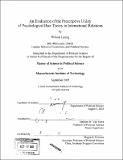An evaluation of the prescriptive utility of psychological bias theory in international relations
Author(s)
Leung, Wilson (Wilson Wan Shun)
DownloadFull printable version (5.035Mb)
Other Contributors
Massachusetts Institute of Technology. Dept. of Political Science.
Advisor
Stephen W. Van Evera.
Terms of use
Metadata
Show full item recordAbstract
I evaluate the practical utility of psychological bias theory by examining two historical cases - the US decision to cross the 38th parallel in 1950 and the British policy of appeasement towards Germany in the 1930s - asking in each of these whether the theory could have helped policymakers to make better decisions. Drawing from the lessons of these two cases, I argue that psychological bias theory can help foreign-policymakers to improve their decisionmaking capabilities and hence increase their chances of achieving favorable outcomes in international politics. However, even if the prescriptions of the theory are adopted, there is no guarantee that positive outcomes will obtain in every case because outcomes are affected by at least two other factors that one largely cannot control: the availability of information and the misperceptions suffered by one's opponent. I also discuss other research methods that could be used to investigate the utility of the theory: examining how useful its prescriptions have been; looking at whether people can actually correct their psychological biases; and considering whether policymakers should attempt to rectify their biases.
Description
Thesis (S.M.)--Massachusetts Institute of Technology, Dept. of Political Science, 2005. Includes bibliographical references (p. 81-87).
Date issued
2005Department
Massachusetts Institute of Technology. Department of Political SciencePublisher
Massachusetts Institute of Technology
Keywords
Political Science.